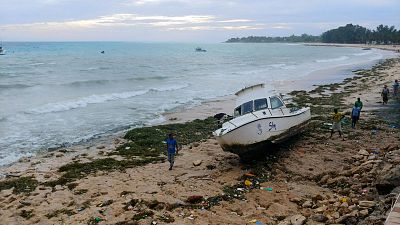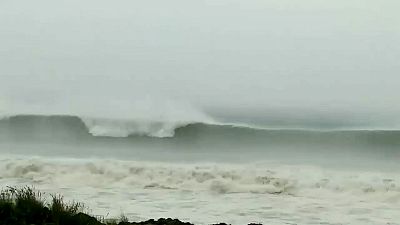"Families whose lives have been turned upside down by these climate-related disasters need the generosity of the international community to survive."
JOHANNESBURG — A powerful cyclone continued to dump rain on northern Mozambique Friday, with the United Nations warning of "massive flooding."
Cyclone Kenneth arrived just six weeks after Cyclone Idai tore into central Mozambique, killing more than 600 people and displacing thousands. The U.N. called it the first time in known history that the southern African nation has been hit by two cyclones in one season.
Gallery
Forecasters said the new cyclone made landfall Thursday night in a part of Mozambique that has not seen such a storm in at least 60 years.
It battered northern parts of the country with winds gusting up to 174 mph after killing three people on the island nation of Comoros.
Mozambique's local emergency operations center said a woman in the city of Pemba was killed by a falling tree, while a "high number" of houses in Macomia district in Cabo Delgado province were destroyed. Four ships sank off Palma town, with no reported deaths, the center said.
"Cyclone Kenneth may require a major new humanitarian operation" in one of the world's poorest nations, even as post-Cyclone Idai relief operations are expected to continue for months, U.N. humanitarian chief Mark Lowcock said in a statement.
"The families whose lives have been turned upside down by these climate-related disasters urgently need the generosity of the international community to survive over the coming months," he said.
Cyclone Kenneth packed the power of a Category 4 hurricane as it approached Mozambique, the Joint Typhoon Warning Center said.
The government, which said it evacuated some 30,000 people ahead of the storm, and aid groups hurried to assess the damage Friday.
Authorities have said there are concerns that five rivers as well as coastal waterways could overflow. Around 680,000 people were in the path of the storm.
The cyclone over the next 10 days is expected to dump twice as much rain as Cyclone Idai did last month, according to World Food Program spokesman Herve Verhoosel.
Power lines were reported down in some communities of northern Mozambique, and Pemba city had significant power outages, said Katie Wilkes, spokeswoman with the International Federation of Red Cross and Red Crescent Societies. "It's been a challenge for us even to have clear lines of communication."
While damage assessments are still in the very early stages, "we know this is a very vulnerable area, higher in poverty" than the one hit last month by Cyclone Idai, she said.













